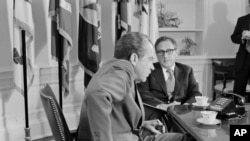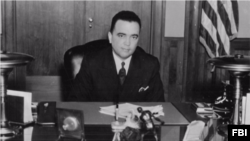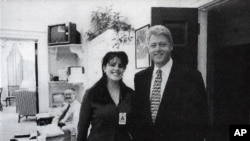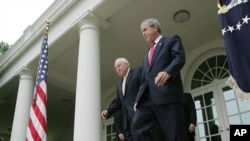Federal Bureau of Investigation (FBI) Director James Comey recently confirmed an investigation into Russian involvement in the 2016 United States elections.
Comey said his agency is studying possible links between Russian officials and the election campaign of then presidential candidate Donald Trump. He said U.S. intelligence had already found the Russian government took steps to influence the vote, with the goal of helping the businessman get elected.
Trump has been office for over two months. His administration has denied that he or members of his campaign team were in contact with Russian officials before the election. Comey told a congressional committee the FBI was still exploring possible ties between Trump’s supporters and Russia. He promised that investigators would “follow the facts wherever they lead.”
The FBI carries out investigations for the Justice Department, which is responsible for enforcing laws and administering justice. Some investigations involve other government agencies or officials.
There have been examples of the FBI investigating possible crimes by U.S. presidents.
Nixon and Watergate
One of the most famous cases was the Watergate scandal, which led to the resignation of President Richard Nixon in 1974. Two years earlier, five men were arrested for breaking into the offices of the Democratic Party. The break-in took place at the Watergate building in Washington, D.C.
During an investigation of the break-in, U.S. lawmakers learned that Nixon had set up recording equipment in the White House. They discovered that discussions between the president and his aides had been recorded.
In the recordings, Nixon was heard ordering officials to tell the Central Intelligence Agency (CIA) to lie to the FBI in an effort to block the investigation. Several people working for Nixon went to jail for their involvement in the Watergate scandal.
Nixon himself faced possible criminal charges and an impeachment from office. On August 8, 1974, he went on national television to announce he would resign the next day.
“I have never been a quitter. To leave office before my term is completed is abhorrent to every instinct in my body. But as president, I must put the interests of America first.”
Newspaper reporters Bob Woodward and Carl Bernstein uncovered and documented the Watergate scandal. The two based their stories on a government official whom they did not identify in their reports. They instead called him “Deep Throat.”
The identity of Deep Throat was kept secret for more than 30 years. In 2005, the unidentified source finally came forward. It was Mark Felt, who had served as the number two man in the FBI during the Watergate years.
In a book, Felt said he understood that some people would always think he was wrong for secretly providing information to the reporters. But he added, “The bottom line is that we did get the whole truth out, and isn't that what the FBI is supposed to do?”
J. Edgar Hoover
The White House tapes showed that before Watergate, Nixon considered removing the longest-serving director of the FBI, J. Edgar Hoover. Hoover led the FBI for 48 years – working for eight different presidents - from 1924 until his death in 1972.
Hoover is credited with turning a new, small agency into an international leader in law enforcement and national security. But he was criticized for aggressively using surveillance to collect information on private citizens and government officials. In some cases, he gave presidents damaging personal information about their political opponents.
During the 1940s and 1950s, Hoover’s leadership was criticized for going too far in campaigns against American communists and supporters of Nazi Germany.
Later, he was seen as having little interest in protecting civil rights. Many police departments had failed to investigate crimes targeting blacks and other civil rights workers in the 1950s and 1960s.
During the 1960s and early 1970s, the FBI was criticized for some of its investigations related to civil rights and Vietnam War protests. In 1975, a Senate committee found that FBI officials had acted wrongly or illegally a number of times.
Four years after Hoover left office, Congress passed a law limiting FBI directors to a single term of 10 years – a rule still in place today. U.S. presidents choose FBI directors and can also remove them.
Here are some notable cases of FBI investigations involving former presidents.
Ronald Reagan - Iran-Contra
This involved secret U.S. weapons sales to Iran during the 1980s. Ronald Reagan’s administration used money from the sales to help rebels trying to overthrow the Nicaraguan government. At the time, American weapons sales to Iran were banned.
The FBI investigated several members of the administration for their part in the arms sales. Reagan himself denied knowing that money was being diverted to the Contra rebels. Several officials were indicted and charged. They included Deputy National Security Advisor John Poindexter and his aide, Oliver North.
Bill Clinton – Whitewater
When Bill Clinton was president, he and his wife Hillary were investigated for wrongdoing in connection with a real estate investment in Arkansas. The project, known as Whitewater, eventually failed and some partners in the deal were accused of fraud and other wrongdoing.
The scandal led to several investigations carried out by U.S. agencies, Congress and a special prosecutor. House and Senate committees ended final hearings on Whitewater in 1994, clearing all members of the Clinton administration who had been investigated.
Bill Clinton – Paula Jones & Monica Lewinsky
In 1994, Paula Jones, a former Arkansas state employee, brought a sexual harassment case against President Clinton. A special prosecutor investigated her accusations. The case was eventually settled out of court for $850,000. Even though Clinton settled the case, he did not admit wrongdoing or apologize to Jones.
During the Jones investigation, a special prosecutor discovered Clinton’s relationship with Monica Lewinsky, a White House volunteer. Clinton publicly denied having sex with Lewinsky. But later he was impeached by the U.S. House of Representatives for lying about the relationship. In 1999, the Senate acquitted Clinton of all charges. He went on to complete his second term in office.
George W. Bush – CIA Leak
When George W. Bush was president, several members of his administration were accused of illegally leaking the identity of CIA agent Valerie Plame. After she was named by a newspaper reporter, Plame said her safety was threatened and her career destroyed.
Plame’s husband had publicly criticized Bush’s policy on Iraq, so the White House was accused of retaliating by leaking Plame’s identity. In the end, a man who had worked for Vice President Dick Cheney, Lewis “Scooter” Libby, was convicted of lying to federal agents investigating the case.
I'm Anne Ball.
And I’m Bryan Lynn.
Bryan Lynn wrote this story for VOA Learning English. His report was based on reports from the Associated Press, VOA News and other sources. George Grow was the editor.
We want to hear from you. Write to us in the Comments section, and visit our Facebook page.
________________________________________________________________
Words in This Story
scandal – n. damage to image; an apparent moral or ethical violation
impeachment - n. the charging of an official of a crime while in office
abhorrent – adj. causing or deserving strong dislike or hatred
instinct – n. a natural desire to want to act in a particular way
divert – v. – v. take something from one place for use somewhere else
indict - v. formally decide to put someone on trial for a crime
real estate – adj. having to do with buildings, home or land
leak – v. give (secret information) to someone so it becomes known to the public
acquit – v. to decide that someone is not guilty of a crime
retaliate – v. do something bad back to someone who did something bad to you











